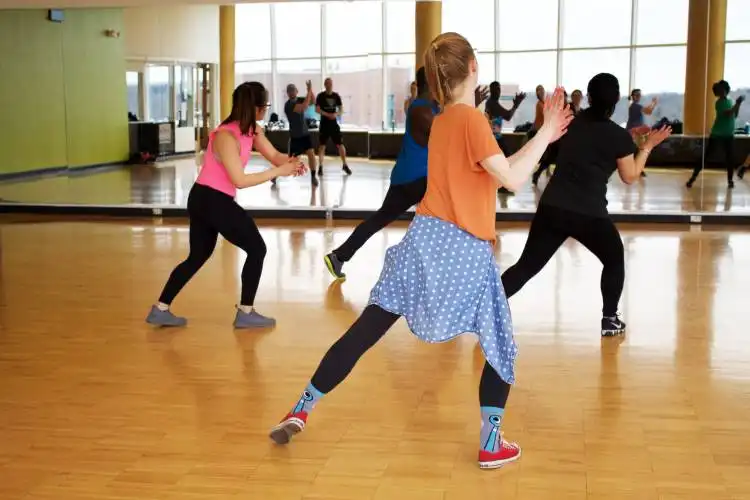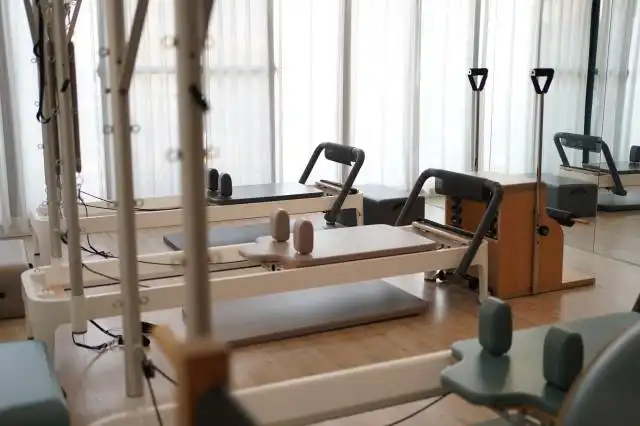Start a Martial Arts Studio
Awakening the Warrior Within: Launching Your Martial Arts Business
| Updated


MARTIAL ARTS STUDIO
Craving for some physical adventure with a pinch of ancient wisdom and discipline? Then, opening a Martial Arts Studio could be your golden ticket! This business revolves around providing training classes in various forms of martial arts, from karate to judo, tai chi to Brazilian jiu-jitsu. Not only will your trade enhance bodies and minds with self-defense skills, self-discipline, and fitness, but you'll also score a point for your entrepreneurial journey, keeping the ancient traditions alive in modern times.
Jump to Business Plan
RELATED BUSINESS IDEAS
Browse ALL Health & Beauty Innovations Business Ideas
Discover Your Perfect Domain
Unlock the door to your online success with our hand-picked selection of premium domain names. Whether you're starting a new venture or rebranding an existing one, the right domain can set the tone for your digital presence. Browse through our curated list, each with its unique potential to enhance your brand's visibility and credibility.
MARTIAL ARTS STUDIO MINI BUSINESS PLAN
This a quick reality check to help you identify the strengths and weaknesses of your business concept before you dive in.
Expected Percent Margin:
- Gross Margin: Approximately 60%
- Net Profit Margin: Approximately 10-30%
Earnings Expectations:
- Daily Earnings: $300 - $700
- Weekly Earnings: $2,100 - $4,900
- Monthly Earnings: $9,000 - $21,000
- Annual Earnings: $108,000 - $252,000
Actions to Hit Those Numbers:
Start-Up Costs:
- Initial Investment: $50,000-$150,000 for leasehold improvements, high-quality equipment, and initial advertising.
Revenue Sources:
- Membership Fees: Offer tiered pricing for different levels of benefits and access.
- Private Lessons: Charge higher rates for focused, 1 on 1 training.
- Merchandise Sales: Selling martial arts gear, branded clothing, and nutritional supplements can supplement income.
Student Acquisition and Retention:
- Targeted Marketing: Social media advertising targeted towards parents and fitness-focused adults.
- Community Involvement: Participate and sponsor local community events to increase visibility.
- Referral Program: Initiate a program to incentivize current members to refer friends and family.
Operational Expenses:
- Staffing: Staffing costs should ideally be less than 30% of your revenue. You'll need to hire certified instructors, and possibly a receptionist and cleaner. The number of staff members can vary based on class sizes.
- Rent: Location costs should ideally be less than 20% of your monthly revenue. Consider the size, location, accessibility, and parking.
Class and Membership Management:
- Class Schedules: Offer a variety of class times to accommodate varying schedules.
- Capacity Management: Keep class sizes manageable for better instruction and customer satisfaction.
These are generalized estimations which can greatly vary due to personal teaching style, types of martial arts taught, whether you own or lease your location, and local demand for martial arts instruction. Always consult with a financial advisor for personalized advice.
NOT WHAT YOU HAD IN MIND? Here are more ideas



Browse ALL Health & Beauty Innovations Business Ideas
Grab Your Business Website Name
Before you get caught up in the whirlwind of setting up your business, invest in a domain name. It's a small but significant step that lays the foundation for your brand and makes it easier for customers to find and trust you. Just like you wouldn't build a house without securing the land first, don't build a business without securing your domain name.
"Why? Can't that wait?" Here's why it shouldn't
Step 1: Determine if Starting a Martial Arts Studio is Right for You
Breakdown of Startup Expenses
Before starting a martial arts studio, it is important to understand the costs associated with the business. This includes the cost of renting a space, purchasing equipment, and hiring instructors. It is also important to consider the cost of marketing and advertising to attract new students. Additionally, the cost of obtaining any necessary licenses or permits should be taken into consideration. All of these costs should be taken into account when determining if starting a martial arts studio is the right endeavor for you.
Breakdown of Ongoing Expenses
In addition to the startup costs, there are also ongoing expenses associated with running a martial arts studio. This includes the cost of utilities, insurance, and supplies. It is also important to consider the cost of providing instructor salaries and any additional staff that may be needed. Additionally, the cost of maintaining the equipment and replacing any items that may need to be replaced should be taken into account. All of these costs should be taken into account when determining if starting a martial arts studio is the right endeavor for you.
Examples of Ways to Make Money
There are a variety of ways to make money with a martial arts studio. This includes charging tuition fees, offering private lessons, and selling merchandise. It is also possible to offer classes in other disciplines such as yoga or tai chi. Additionally, it is possible to host special events such as tournaments or seminars to generate additional income. All of these potential sources of income should be taken into account when determining if starting a martial arts studio is the right endeavor for you.
Step 2: Name the Business
Naming a business can be a difficult task, but it is important to come up with something that is memorable and unique. It should also be something that is easy to remember and pronounce. Consider using a combination of words that are related to the martial arts studio, such as “Karate Dojo” or “Kung Fu Academy.” Additionally, think of words that are related to the local area or culture, such as the name of a nearby mountain or river. It is also important to consider the potential for a website domain name, as this will be important for marketing the business. Finally, it is important to make sure that the name is not already in use by another business.
Register the Business Name
Once a name has been chosen, it is important to register the business name with the local government. This will ensure that no other business can use the same name. Additionally, registering the business name will give the business legal protection and help to establish the business as a legitimate entity. It is also important to register the business name with the United States Patent and Trademark Office, as this will help to protect the business name from being used by other businesses. Finally, registering the business name will also help to establish the business as a legitimate entity in the eyes of potential customers.
Step 3: Obtain the Necessary Licenses and Permits
The third step in starting a martial arts studio is to obtain the necessary licenses and permits. Before beginning the process of obtaining the licenses and permits, it is important to research what is required in the area where the business will be located. Depending on the location, the licenses and permits needed may vary. For example, some states may require a business license, while others may require a special martial arts license. It is important to contact the local government and ask about the specific requirements for the area.
Apply for the Licenses and Permits
Once the licenses and permits needed have been identified, it is time to apply for them. This process can take some time, so it is important to plan ahead. Most licenses and permits will require an application to be filled out and submitted, along with any necessary fees. Depending on the location, some licenses and permits may need to be renewed on an annual basis. It is important to keep track of the expiration dates and make sure to renew them on time.
Obtain Insurance
In addition to the licenses and permits, it is important to obtain the necessary insurance for the martial arts studio. This will help protect the business and its owners in the event of an accident or injury. It is important to research the different types of insurance available and find the one that best fits the needs of the business. Depending on the type of martial arts being taught, some insurance policies may be required by law.
Hire Employees
Finally, it is important to hire employees for the martial arts studio. This may include instructors, receptionists, and other staff members. It is important to research the local labor laws and make sure to comply with them. It is also important to make sure that all employees are properly trained and certified in the martial arts they will be teaching. This will help ensure that the martial arts studio is providing the highest quality instruction.
Step 4: Secure a Location
When choosing a location for a martial arts studio, it is important to consider the size of the space, the cost of rent, and the accessibility of the location. The size of the space should be large enough to accommodate the number of students you plan to have in classes. The cost of rent should be affordable, and the location should be easily accessible for students.
Leasing or Buying
When it comes to securing a location for a martial arts studio, there are two main options: leasing or buying. Leasing is often the more cost-effective option, as it allows for more flexibility and requires less of an upfront investment. However, if you plan to stay in the same location for a long time, buying may be the better option.
Negotiating with the Landlord
Once you have identified a potential location, it is important to negotiate with the landlord. This includes negotiating the terms of the lease, such as the length of the lease, the amount of rent, and any additional fees. It is also important to make sure that the landlord is aware of the type of business you plan to run and that they are comfortable with it.
Obtaining Necessary Permits
Once you have secured a location, it is important to obtain the necessary permits and licenses. This includes any permits required by the local government, as well as any insurance policies you may need. It is also important to make sure that the location is up to code and meets all safety requirements.
Step 5: Develop a Business Plan
When creating a business plan for a martial arts studio, it is important to include a detailed description of the services that will be offered, a marketing plan, a financial plan, and a plan for managing the business. The services should include a description of the type of martial arts that will be taught, the number of classes that will be offered, the cost of classes, and any other services that will be offered. The marketing plan should include an analysis of the target market, a description of the marketing strategies that will be used, and a timeline for implementation. The financial plan should include a breakdown of startup expenses, ongoing expenses, and potential sources of income. Finally, the plan for managing the business should include a description of the roles and responsibilities of each team member, a timeline for implementation, and a plan for evaluating the success of the business.
Tips for Writing a Business Plan
When writing a business plan for a martial arts studio, it is important to be thorough and detailed. Start by researching the industry and the local market to get a better understanding of the competition and the potential for success. Then, create a detailed budget for both startup and ongoing expenses. Make sure to include a plan for generating income, such as membership fees, private lessons, and merchandise sales. Finally, create a timeline for implementation and a plan for evaluating the success of the business. This will help ensure that the business is successful and profitable.
Step 6: Set Up the Studio
When setting up the martial arts studio, it is important to consider the type of furniture and equipment needed. This includes mats, punching bags, weights, and other necessary items. It is also important to consider the size of the studio when purchasing furniture and equipment. For example, if the studio is large, it may be necessary to purchase larger mats and heavier weights. Additionally, it is important to consider the type of martial arts being taught in the studio. For example, if the studio is teaching karate, it may be necessary to purchase karate uniforms and other specialized equipment.
Licensing and Permits
When setting up the martial arts studio, it is important to obtain the necessary licensing and permits. This may include a business license, zoning permits, and other permits depending on the location. Additionally, it may be necessary to obtain liability insurance to protect the business from any potential lawsuits. It is important to research the local laws and regulations to ensure that the business is in compliance. Additionally, it is important to ensure that the studio meets all safety requirements.
Advertising
When setting up the martial arts studio, it is important to create an advertising plan. This may include creating a website, setting up social media accounts, and creating flyers and other promotional materials. Additionally, it may be beneficial to partner with local businesses to promote the studio. It is also important to consider online advertising, such as search engine optimization and pay-per-click advertising. Additionally, it may be beneficial to offer discounts and promotions to attract new customers.
Step 7: Market the Studio
When it comes to marketing the martial arts studio, there are a few different methods that can be used. Social media is a great way to reach potential customers, as it is free and easy to use. Creating a website or blog is also a great way to reach potential customers, as it allows for more information to be shared. Additionally, flyers and posters can be used to advertise the studio in the local area. Finally, word of mouth is also a great way to market the studio, as it can help to spread the word about the studio quickly.
Tips for Effective Marketing
When it comes to marketing the martial arts studio, it is important to create a strong brand identity. This can be done by creating a logo and slogan that will be associated with the studio. Additionally, it is important to create content that is interesting and engaging, as this will help to draw potential customers in. Furthermore, it is important to be consistent with marketing efforts, as this will help to ensure that the studio is always top of mind for potential customers. Finally, it is important to track the results of marketing efforts, as this will help to determine which methods are the most effective.
Step 8: Hire Instructors
When hiring instructors for a martial arts studio, it is important to look for certain qualifications. First and foremost, instructors should have a deep understanding of the martial arts discipline they will be teaching. They should also have a background in teaching and be able to effectively communicate with students. Additionally, instructors should have a passion for martial arts and be able to motivate and inspire students. Finally, instructors should have a strong sense of responsibility and be reliable.
Finding Instructors
Finding qualified instructors for a martial arts studio can be a challenge. One of the best ways to find instructors is to network with other martial arts studios in the area. Additionally, instructors can be found through martial arts organizations, martial arts websites, and through word of mouth. Finally, instructors can be found by posting job ads in local newspapers and online job boards.
Training Instructors
Once instructors have been hired, it is important to provide them with training. This should include a thorough overview of the studio’s policies and procedures, as well as a review of the martial arts discipline they will be teaching. Additionally, instructors should be trained in customer service and how to effectively communicate with students. Finally, instructors should be trained in safety protocols and how to properly use the studio’s equipment.
Step 9: Open the Doors
The ninth and final step in starting a martial arts studio is to open the doors and welcome students. It is important to plan a successful grand opening to make a good first impression. Consider inviting local media to cover the event, as well as offering discounts or giveaways. Additionally, it is important to have a well-trained staff on hand to answer questions and provide tours. It is also important to have a well-stocked studio with all the necessary equipment, uniforms, and other supplies. Finally, it is important to have a plan for marketing the studio, such as a website, social media accounts, and flyers. All of these steps will help ensure a successful grand opening and a successful martial arts studio.
EXPLORE MORE CATEGORIES
Browse ALL Business Idea Categories
TAKE THE NEXT STEPS









